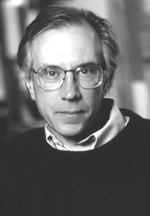Thomas Cech
Thomas Robert Cech (born December 8, 1947) is an American biochemist and molecular biologist who was awarded the Nobel Prize in Chemistry in 1989, sharing it with Sidney Altman, for their discovery of the catalytic properties of RNA. This groundbreaking work demonstrated that RNA is not only a molecule of heredity but can also function as a catalyst, a role that was previously thought to be reserved only for proteins. This discovery has had profound implications for the fields of molecular biology, genetics, and biochemistry, and has significantly advanced our understanding of the origin of life and the complex functions of RNA in living organisms.
Early Life and Education[edit | edit source]
Thomas Cech was born in Chicago, Illinois, and grew up in Iowa City, Iowa. He developed an interest in chemistry at an early age, inspired by his father's background in medicine. Cech pursued his undergraduate degree in chemistry at Grinnell College, where he graduated with a B.A. in 1970. He then went on to earn his Ph.D. in chemistry from the University of California, Berkeley in 1975, where he focused on the biochemistry of nucleic acids, a class of molecules that includes DNA and RNA.
Career and Research[edit | edit source]
After completing his Ph.D., Cech joined the faculty of the University of Colorado Boulder in 1978, where he began his pioneering research on the catalytic properties of RNA. In the early 1980s, Cech and his research team discovered that an RNA molecule from the ciliate protozoan Tetrahymena thermophila could catalyze the cleavage and ligation of RNA strands without the need for proteins. This RNA molecule, which they termed a ribozyme, challenged the prevailing view that biological catalysis was solely the domain of proteins.
Cech's discovery of ribozymes provided the first evidence that RNA could act as both genetic material and a biological catalyst, supporting the hypothesis of an RNA world in which early forms of life relied on RNA for both genetic information storage and catalytic functions. This work has led to significant advancements in our understanding of the evolution of life and the role of RNA in biology, including the development of new therapeutic strategies based on RNA molecules.
Awards and Honors[edit | edit source]
In recognition of his contributions to science, Thomas Cech has received numerous awards and honors, including the Nobel Prize in Chemistry in 1989. He has also been elected to several prestigious organizations, including the National Academy of Sciences and the American Academy of Arts and Sciences. Cech has continued to contribute to the scientific community through his research, teaching, and leadership roles, including serving as the president of the Howard Hughes Medical Institute from 2000 to 2009.
Legacy and Impact[edit | edit source]
Thomas Cech's work has fundamentally changed our understanding of the role of RNA in biology. His discovery of ribozymes has opened up new fields of research, including the study of RNA interference (RNAi) and the development of RNA-based therapies for various diseases. Cech's contributions to science extend beyond his research findings; he has been a mentor to numerous students and young scientists, fostering the next generation of researchers in biochemistry and molecular biology.
See Also[edit | edit source]
Search WikiMD
Ad.Tired of being Overweight? Try W8MD's physician weight loss program.
Semaglutide (Ozempic / Wegovy and Tirzepatide (Mounjaro / Zepbound) available.
Advertise on WikiMD
|
WikiMD's Wellness Encyclopedia |
| Let Food Be Thy Medicine Medicine Thy Food - Hippocrates |
Translate this page: - East Asian
中文,
日本,
한국어,
South Asian
हिन्दी,
தமிழ்,
తెలుగు,
Urdu,
ಕನ್ನಡ,
Southeast Asian
Indonesian,
Vietnamese,
Thai,
မြန်မာဘာသာ,
বাংলা
European
español,
Deutsch,
français,
Greek,
português do Brasil,
polski,
română,
русский,
Nederlands,
norsk,
svenska,
suomi,
Italian
Middle Eastern & African
عربى,
Turkish,
Persian,
Hebrew,
Afrikaans,
isiZulu,
Kiswahili,
Other
Bulgarian,
Hungarian,
Czech,
Swedish,
മലയാളം,
मराठी,
ਪੰਜਾਬੀ,
ગુજરાતી,
Portuguese,
Ukrainian
Medical Disclaimer: WikiMD is not a substitute for professional medical advice. The information on WikiMD is provided as an information resource only, may be incorrect, outdated or misleading, and is not to be used or relied on for any diagnostic or treatment purposes. Please consult your health care provider before making any healthcare decisions or for guidance about a specific medical condition. WikiMD expressly disclaims responsibility, and shall have no liability, for any damages, loss, injury, or liability whatsoever suffered as a result of your reliance on the information contained in this site. By visiting this site you agree to the foregoing terms and conditions, which may from time to time be changed or supplemented by WikiMD. If you do not agree to the foregoing terms and conditions, you should not enter or use this site. See full disclaimer.
Credits:Most images are courtesy of Wikimedia commons, and templates, categories Wikipedia, licensed under CC BY SA or similar.
Contributors: Prab R. Tumpati, MD

